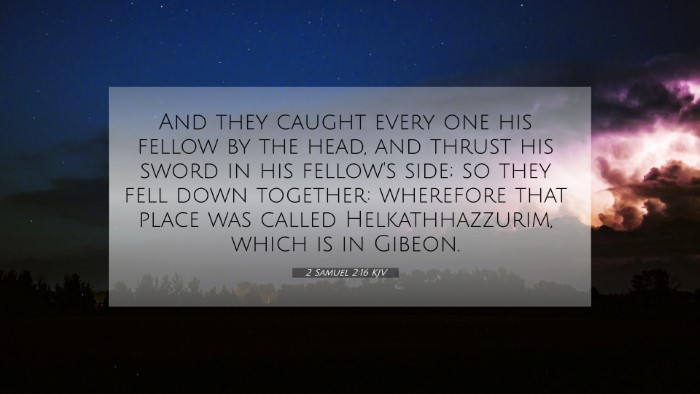Understanding 2 Samuel 2:16
Bible Verse: 2 Samuel 2:16 - "And they caught every one his fellow by the head, and thrust his sword in his fellow's side: so fell down together."
Overview of the Verse
This verse describes a disturbing encounter during a conflict between two groups: the servants of David and the servants of Ishbosheth. Here, the actions taken by each group lead to mutual destruction, emphasizing the violence and chaos of civil war. The imagery of one man thrusting a sword into the side of his fellow highlights the brutal nature of their confrontation and offers a poignant commentary on the futility of conflict.
Commentary Insights
Insights incorporated from notable public domain commentaries:
- Matthew Henry: Henry elaborates on the tragic consequences of civil strife. He emphasizes that the conflict here leads not to victory, but to mutual destruction, illustrating the concept that fighting among brethren can only yield death and despair.
- Albert Barnes: Barnes notes that this battle showcases the brutality of human conflict and how it can often escalate unnecessarily. He points out the need for unity and the dangers posed when individuals become embroiled in personal grievances rather than pursuing peace.
- Adam Clarke: Clarke interprets the phrase, "caught every one his fellow by the head," as an act of bewilderment and confusion amid chaos, signifying how individuals may lose sense of purpose in battles, turning against their own in frenzy.
Thematic Connections
This verse opens up a dialogue on themes such as:
- Violence in Human Nature: It reflects on the propensity of humans in conflict situations to betray and harm one another, often leading to grave consequences.
- Consequences of Civil War: The verse serves as an epitome of the ruination wrought by civil wars, as they often leave families and nations in tatters.
- Divine Judgment: The chaos depicted here alludes to a divine judgment that allows individuals to face the repercussions of their violent actions.
Cross-References
2 Samuel 2:16 is connected to various other Bible verses through contextual and thematic parallels:
- James 4:1: "From whence come wars and fightings among you? Come they not hence, even of your lusts that war in your members?" - emphasizes the root of conflicts.
- Matthew 5:9: "Blessed are the peacemakers: for they shall be called the children of God." - highlights the importance of peace in contrast to conflict.
- Galatians 5:15: "But if ye bite and devour one another, take heed that ye be not consumed one of another." - illustrates the destructive nature of internal conflict.
- Proverbs 17:14: "The beginning of strife is as when one letteth out water: therefore leave off contention, before it be meddled with." - warns against allowing strife to escalate.
- Ecclesiastes 3:8: "A time to love, and a time to hate; a time of war, and a time of peace." - contrasts the appropriateness of different times for action.
- Romans 12:18: "If it be possible, as much as lieth in you, live peaceably with all men." - encourages striving for peace.
- Matthew 12:25: "And Jesus knew their thoughts, and said unto them, Every kingdom divided against itself is brought to desolation;" - conveys the destructive nature of internal divisions.
Tools for Understanding Bible Cross-References
For those seeking to delve deeper into the meanings and connections of Bible verses, here are some effective resources and methods:
- Bible Concordance: Use a concordance to find verses that relate to specific keywords or themes.
- Bible Cross-reference Guide: Guides typically list verses alongside each other, making cross-references clear and accessible.
- Cross-reference Bible Study: Study methods that focus on tracing themes through various scriptures to understand their connections.
- Bible Reference Resources: Resources like thematic Bibles group verses by overarching themes for easier study.
Conclusion
In summary, 2 Samuel 2:16 not only recounts a moment of intense violence but also serves as a reflection on the larger themes of conflict and the chaos ensuing from human strife. By contextualizing this verse with cross-references and commentaries, one gains profound insights into humanity's struggles, the perils of division, and the ultimate need for unity and peace.


